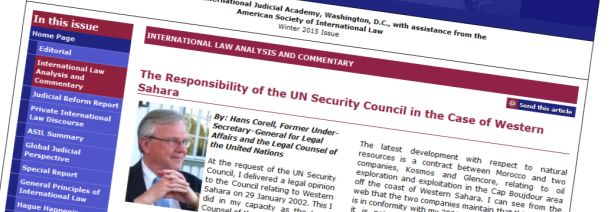
Louisiana fishermen, victims of the BP Gulf spill, could be moving their place of work to an occupied country, supporting an illegal and brutal regime. This might be the reality if Washington lobbyists get what they want. Press release, Western Sahara Resource Watch, 30 July 2010.
Press release,
Western Sahara Resource Watch
30 July 2010
In the occupied territory of Western Sahara, a country located in North-West Africa, peaceful demonstrators are subjected to severe human rights violations when they speak out for their legitimate right to independence. Morocco illegally occupied the territory in 1975, and the Moroccan government today uses all means to cement the occupation, by attracting foreign companies to the territory.
A group of Washington lobbyists is now trying to make this the new haven for Louisiana fishermen affected by the oil spill.
“The BP oil spill is an unimaginable disaster for the entire Gulf Coast environment. But no matter how much we sympathize with the Louisiana fishermen who have had their livelihood ruined, we hope they will reject all offers to enter into shady business deals prolonging the sufferings of the Sahrawi people on the other side of the Atlantic”, stated Sara Eyckmans, coordinator of the international organisation Western Sahara Resource Watch.
The foreign business activity in Western Sahara is used by Morocco to gain political points in its occupation, and to finance their costly military presence in the resource rich area.
“As long as Morocco can attract business to Western Sahara and earns money on the illegal occupation, the hardships and sufferings of the Sahrawi people will only continue. We appeal to the fishermen of Louisiana and to US legislators to find other ways around the problem, than by profiting from the resources that belong to the oppressed Sahrawi people”, stated Eyckmans.
According to the well-informed news service Africa Intelligence, two pro-Moroccan lobbyists in Washington have received 140,000 USD in order to “woo fishing companies displaced from the Gulf of Mexico and the production technologies to help Morocco upgrade its fisheries industry”. The Morocco paid lobbyist group is headed by a Louisiana native and a former Mississippi member of the House of Representatives.
The Sahrawi people has repeatedly called on the international community to avoid engaging in business deals with Morocco covering their natural resources. Most people employed in the fisheries sector in Western Sahara are today Moroccan settlers, whom Morocco has moved into the territory in violation of the Fourth Geneva Convention. Morocco refuses to give the Sahrawi self-determination, a right which more than 100 UN resolutions have demanded that they be granted. The International Court of Justice has found Morocco’s claims to the territory groundless. The US government has previously stated explicitly that Western Sahara is excluded from the US-Moroccan free trade cooperation.
It is not the first time that Morocco has tried to make use of oil spills to attract fishermen to the occupied country. Also in 2002, when the oil tanker 'Prestige' caused an ecological disaster along the coasts of Spain, Morocco succeeded in convincing the Spanish government to send its fishermen to Western Sahara.
Read more about the new lobby effort and the 'Prestige' history here.
For comments and clarifications:
Sara Eyckmans
Coordinator, Western Sahara Resource Watch
coordinator@wsrw.org
Carlos Wilson, Los Angeles
US-Western Sahara Foundation
Christina Kiel, New Orleans
Western Sahara Resource Watch – section Louisiana
christina.kiel@gmail.com
Corell: EU must revise fisheries agreement, oil drilling irresponsible
Former UN Legal Counsel Hans Corell urges in an article yesterday the EU to revise its Fisheries Partnership Agreement due to the Moroccan King's recent statement on Western Sahara. He also states that the oil exploration is in violation of the legal opinion he wrote for the UN Security Council.
Background to the affair on BP Gulf victims
Report: EU-Morocco fisheries depends on illegal occupation
An external evaluation report on the EU-Morocco fisheries agreement 2019-2023 confirms that the agreement revolves, in its entirety, around Western Sahara.
Rapid growth of conflict oysters
Half of Moroccan shellfish exporters approved for export into the EU, are in fact located in occupied Western Sahara.


